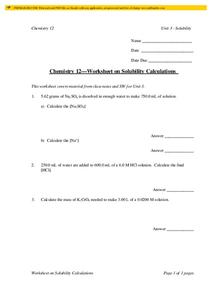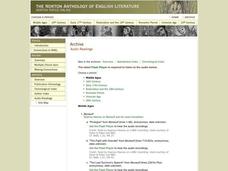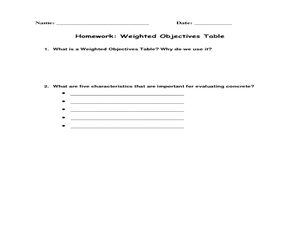Curated OER
What Properties Do Solutions Have?
In this solutions worksheet, students will write down two properties that solutions have and then will come up with a conclusion about solutions based on their facts.
Curated OER
Mixing Fertilizer
Your young landscapers do concentration calculations in this problem dealing with mixing fertilizer. Learners use and analyze rational expressions within this context.
Curated OER
Quinoa Pasta 2
Learners discover that a system of linear equations models this mixture of quinoa and corn in a collaborative task. Your learners receive all the relevant information in this second of three variants of tasks that ask them to find the...
Concord Consortium
Protein Folding
Long strings of amino acids fold themselves into stable peptides. The simulation allows scholars to observe the process in multiple ways. Using hydrophobic, hydrophilic, or a combination of proteins in three different solutions, the...
Beyond Benign
Urine Jeopardy
Urine can tell us a lot about what is happening in our bodies. In a hands-on activity, scholars administer pH, glucose, ketone, and protein tests to a sample of "urine" solution made from household ingredients. Their results lead them to...
Curated OER
Solubility
In this solubility worksheet, students calculate the final concentrations of the ions involved in a chemical mixture. Students calculate the solubility of different compounds. This worksheet has 13 problems to solve.
Curated OER
The Separation Problem
In this mixture separation instructional activity learners problem solve a variety of ways to separate mixtures. After generating solution ideas to separating mixtures of solids prompts on the one page sheet students are prompted to...
Curated OER
Classification of Changes
In this classification of changes worksheet, students identify each example as either chemical or physical changes. Students also classify other examples as either element, compound, solution, colloid, or suspensions. In the other...
Curated OER
Solids and Water
Students investigate mixtures made of water and familiar solid materials. They observe and discuss the changes that occur immediately and set the mixtures aside for a day. Finally, students observe the mixtures, note changes, and graph...
Curated OER
Water Unit
In this water worksheet, students review the properties of water including the density, boiling point, and evaporation. Students define mixture, solute, and solvent. This worksheet has 22 short answer questions.
Illustrative Mathematics
Quinoa Pasta 1
Here is a great opportunity to introduce your mathematicians to a food they may never have heard of, quinoa. It may help to show a short video on quinoa, or make some quinoa for the class to try. Once they get over how to say quinoa,...
Curated OER
Solutions
In this solutions worksheet, students determine the pH or molar solubility of different solutions. Students state is the mixture given forms a buffer. This worksheet has 20 problems to solve.
Curated OER
It's a Mixed Up World!
Middle schoolers examine the importance of applying the scientific knowledge of elements, mixtures, and compounds to manufacture consumer goods and conduct civil operations, such as water purification. They also practice categorizing...
Curated OER
Mixtures
In this mixtures pre-lab worksheet, learners compare and contrast suspensions and colloids and solutions and colloids. Students describe the Tyndall effect. This worksheet has 10 short answer questions.
Cornell University
Nano Interactions
Tiny particles can provide big learning opportunities! Middle school scientists explore the world of nanoparticles through reading, discussion, and experiment. Collaborative groups first apply nanotechnology to determine water hardness....
Curated OER
Parts-Per-Million Concentration Lab
Students develop a comprehension of parts per million as a concept. They work in teams to create successive dilutions of a solution to reach a parts-per-million concentration. Students list what they think the atmosphere is made of. They...
Curated OER
Acids, Bases, and Buffers
In this acids and bases worksheet, students test the pH of different solutions to determine if it is basic or acidic. Students complete 7 short answer questions based on their results.
Curated OER
The Effect of Concentration Changes on Equilibrium
In this concentration changes and equilibrium worksheet, students experiment with iron (III) ions and thiocyanate ions to observe the effects of concentration on the equilibrium of solutions. Students make observations of their mixtures,...
Curated OER
Weighted Objectives Table and Optimum Mix Sheet
Young scholars analyze data and determine an appropriate concrete mixture. In this technical solutions lesson plan, students discuss weighted objectives, review sample scenarios, and rate concrete recipes to identify how well water...
Curated OER
Matter Overview
There is not much information in this presentation. It serves more as a guide to direct the flow of your introductory chemistry lecture. Each slide displays a large title and a smaller phrase meant to explain it. For example, one title...
Curated OER
Sore Throats, Variation 1
Why does Nia's water taste saltier than Trey's if she put more into her cup than he did? Math masters set up proportions in order to compare the mixtures. This task effectively has learners apply the concepts of ratio and proportion to a...
University of Georgia
What's So Special about Bottled Drinking Water?
Is artesian water designed to be better, or is it just from wells similar to those in the city of Artesium? This experiment looks at many different types of bottled waters, including artesian. Using a soap mixture, scholars test to see...
Curated OER
Lab: Percent of Composition of KClO3
Students find the percent of oxygen in potassium chlorate. In this percent composition lesson plan, students heat a solution of potassium chlorate using a catalyst, manganese dioxide, to decompose the potassium chlorate and release...
American Chemical Society
Dissolving M-and-Ms
Learning ... how sweet it is! A hands-on lesson uses colored candies to demonstrate how positive and negative charges interact. Pupils use different types of liquids and watch as the color from the candies spreads—or doesn't.
Other popular searches
- Mixtures and Solutions
- Mixtures Solutions
- Science Mixtures Solutions
- Compounds Mixtures Solutions
- Science Mixtures & Solutions
- Science Mixtures and Solutions
- Mixtures & Solutions
- Mixtures Solutions Density
- Mixtures, Solutions

























